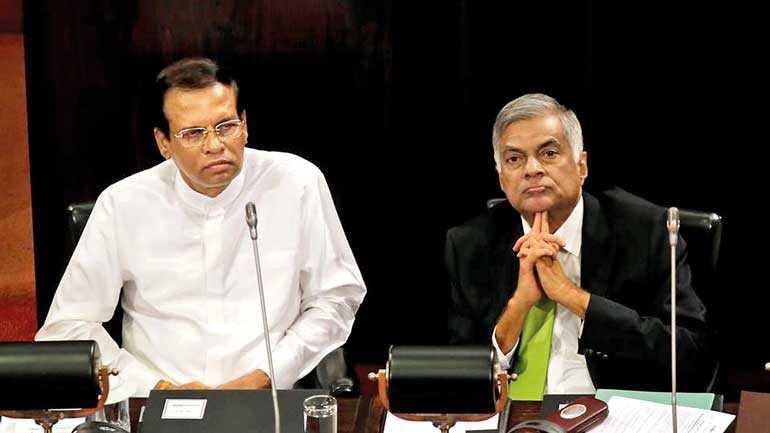Wednesday Feb 18, 2026
Wednesday Feb 18, 2026
Monday, 1 April 2019 00:00 - - {{hitsCtrl.values.hits}}

President Maithripala Sirisena and Prime Minister Ranil Wickremesinghe in Parliament
In all democracies, whether they are matured or not, periodic elections to change governments have lost their credibility and substance in the prevailing neoliberal economic world order. In this order it is global capital represented by its corporate oligarchs that actually dictates policies and sets the agenda for political parties and their leaders to implement. These parties are nothing but agents of this global oligarchy that permits them to introduce cosmetic changes with some nationalist veneer, but without structurally damaging the set neoliberal agenda.
In essence, what makes the difference between competing political parties is the way they repackage and sell it to the voting public. Thus, the choice presented to voters at elections is one of form and not substance, like choosing between Pepsi-Cola and Coca-Cola. Major parties sell the same wine in differently coloured bottles.
Given this global background Sri Lanka is about to face at least two if not three elections before the end of this year. The election virus is spreading fast starting from President Sirisena himself. Every one of his moves including his late awakening about the bond scam and drug menace is taken with an eye on the forthcoming presidential election. Whether he stands a chance to be a nominee for that office on behalf any of the major political parties is still a sixty-four thousand dollar question.

In the case of the General Election however, the two chief contenders are the UNP and SLPP. President Sirisena’s SLFP rump, a possible third, may split and join either of the other two, depending on who promises what to SLFP members. The same goes to other minor parties except perhaps JVP, which, given its revolutionary past and prolonging reluctance to come out with a manifesto, is destined to remain in the opposition at least for the time being. There is no doubt that this party has the potential to become the third alternative in the future.
The real question is, do these elections matter? The question should be split into two parts: Do they matter to the voters and do they matter to the contestants. The choice facing the Sri Lankan voter in both elections, presidential as well as parliamentary, is limited to names and labels rather than policies and programs. To concentrate on the General Election for the moment, what are the economic policies and programs that are going to improve the living conditions of the ordinary citizen offered by the two main parties?
There was a time when UNP and SLFP presented a distinctly different set of policies and approaches in respect of economic and developmental issues that confronted the country. While both parties supported a mixed economy, UNP, as it is now, was more market oriented with open invitation to foreign capital than the SLFP. The latter even formed a coalition with the left to make that difference even more distinct. That was at a time when even internationally, this difference was reflected starkly in the economic policies of not only between the two superpowers during the Cold War but also between major parties in other countries.
The situation has radically changed after the end of Cold War and collapse of economic dirigisme. Economic liberalism is the solitary economic paradigm that has gone global and Sri Lanka’s two main parties had no choice but to embrace it totally.
Given this economic congruence between the two contending parties, how differently are they going to solve at least the following problems facing the country currently? A persistent and worsening trade deficit causing currency depreciation, which alone is contributing to increase the burden of an already unbearable national debt; rising cost of living leading to increase in the incidence of poverty, household debt and even suicides; falling standards of public health and education; uncontrolled corruption and a growing market for narcotics; and callous neglect of natural environment.
Which one of the two parties has so far come out with a workable policy package to tackle these issues? None, to be precise. Why? Because, they both know very well that these issues are mostly systemic in origin and that the two parties are absolutely powerless to change the system. The country has been dragged so deep into the open economy quagmire since 1977, that what any government can do is to introduce some palliatives to ease the pain temporarily through the annual budgets, as Minister Samarawickrema has done recently. In such a situation do elections matter to an ordinary voter?
However, they matter a lot to the current and aspiring politicians. As far as common people are concerned their economic fortunes or misfortunes will continue with little change, whether it is the UNP or a UNP-led coalition, or, SLFP or SLFP headed coalition that governs over them. If there is to be some improvement in people’s living conditions that will largely be in spite and not because of Government policies. On the contrary, to the politicians in the field, victory at elections open unlimited opportunities to accumulate wealth and fortunes. To become a parliamentarian in Sri Lanka is the quickest way to amass wealth under the cover of law. How else can one explain the wealth of Sri Lankan parliamentarians, some of whom do not even possess the basic educational credential to qualify for employment in the open market? To the vast majority of them elections provide an opportunity to invest on their future.
Thus, without any meaningful economic policies to fight for or solutions to offer, and with unquenchable thirst for political power, how are these politicians going to convince voters to choose them? There will always be the ethnic and religious issues to whip up the emotions of electors. Controversies over constitutional amendments, devolution of power, status and place of Buddhism, and federalism and so on are never resolved but kept in reserve to bring them back to political platforms on the eve of elections.
This had been the running saga of Sri Lankan elections, and the forthcoming one will surely be fought on these issues. In the prevailing economic world order such issues do not impinge on the working of the order itself and therefore are tolerated.
Unfortunately, whoever wins the context, the poor voter will be the ultimate loser. How many times is he or she going to be fooled by this phantom democracy? If my memory is correct, this is the third time I am suggesting that Sri Lanka requires a technocratic cabinet with an iron fist at the helm. Periodical elections to choose policy bankrupt political parties and their leaders are not going to deliver that outcome.
(The writer is attached to the School of Business and Governance, Murdoch University, Western Australia.)